#UPSC mains question paper
Text
Bridging the Gap: Transitioning from UPSC Prelims to UPSC Mains Preparation
When individuals hoping to become civil officials undertake the arduous task of preparing for the Union Public Service Commission (UPSC) examination, they encounter a crucial shift from the preparatory phase to the mains. The aforementioned transition holds significant importance, as it necessitates a fundamental change in one's cognitive perspective, study methodology, and comprehensive preparatory tactics. In order to manage this transition proficiently, it is crucial to conduct an analysis and derive insights from the previous year question papers of the UPSC, with a particular emphasis on the UPSC mains question paper. This process enables individuals to comprehend the dynamic patterns and anticipated requirements that the examination presents. This blog aims to explore the significance of UPSC previous year question paper, with a specific emphasis on UPSC mains question papers, as a valuable resource for facilitating a smooth transition from prelims to mains preparation.
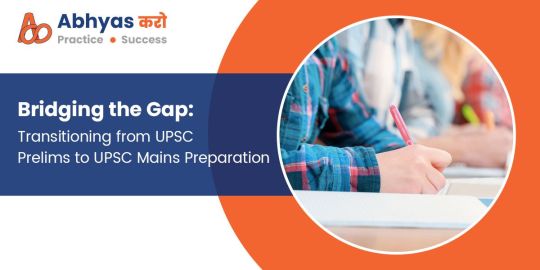
Understanding the Significance of UPSC Previous Year Question Papers:
One of the most significant resources available to candidates throughout their preparation for the Mains exam is the collection of UPSC Previous Year Question Papers. This offers a comprehensive analysis of the examination structure, question formats, and the relative importance assigned to various subject areas. The examination of these papers enables individuals to discover the crucial areas that warrant their attention and acquire a deeper understanding of the examiner's anticipated standards.
Insights from UPSC Mains Question Papers:
The UPSC mains examination evaluates not just one's knowledge but also their proficiency in effectively expressing ideas and presenting arguments. Practising previous UPSC mains question papers enables candidates to identify recurring patterns in question formulation, get insight into the extensive array of subjects addressed, and adapt their study approach accordingly. Moreover, it facilitates the understanding of the extensive scope and range of knowledge required, facilitating a holistic and thorough approach to studying.
Case Study: UPSC Question Papers 2019 and 2022
In order to gain a comprehensive understanding and formulate effective strategies for a smooth transition from preliminary to main examination preparation, it is imperative to closely examine and practice the UPSC question paper 2019, UPSC 2022 prelims question paper, and UPSC question paper 2022. By analysing these question papers, valuable insights can be derived, enabling the identification of practical measures to enhance the preparation process.
· UPSC Question Paper 2019 Analysis:
An analysis of the UPSC question paper 2019 reveals a discernible shift towards a more analytical and multidimensional approach. The inquiries necessitated a thorough comprehension of current matters, historical backdrop, and discerning examination. The study underscored the need to achieve conceptual clarity and the capacity to establish connections across disparate disciplines, hence emphasising the necessity for comprehensive preparation.
Candidates must critically evaluate and adjust their preparatory methodologies in accordance with this change in emphasis. To excel in the mains test, it is crucial to prioritise the development of critical thinking skills, the integration of several courses, and the continuous engagement with current affairs.
· UPSC Question Paper 2022 Analysis:
The UPSC question paper 2022 demonstrated a dynamic structure that placed significant emphasis on the practical application of knowledge and the cultivation of inventive thinking. The inquiries necessitated a comprehensive grasp of the subject matter, compelling candidates to establish links between various subjects and demonstrate a more profound comprehension.
In order to effectively bridge the gap between preliminary and main examinations, it is imperative for applicants to have the capacity to apply theoretical knowledge in practical contexts. In order to match the growing demands of the UPSC mains examination, it becomes imperative to incorporate current affairs into core subjects and engage in answer writing practice.
Actionable Steps for Transitioning Effectively:
In order to facilitate a seamless transition from UPSC prelims to mains preparation, it is advisable for aspirants to take into account the following practical measures:
In-depth Analysis: This study aims to conduct a comprehensive analysis of past years' UPSC mains question papers, with the objective of detecting repeating themes, question patterns, and the evolving strategy employed by the examiners.
Interlinking of Subjects: The cultivation of the ability to interlink various subjects, establish linkages between concepts, and comprehend the interdisciplinary character of the UPSC mains examination is essential.
Current Affairs Integration: The incorporation of current affairs into academic studies allows for the integration of contemporary perspectives into key disciplines, ensuring that one remains informed and up-to-date.
Practical Application: Emphasising the utilisation of theoretical knowledge in practical, real-world situations. Engage in the exercise of answer writing by adopting a problem-solving approach, while maintaining a pragmatic perspective in formulating your responses.
Mock Tests and Time Management: Regularly engaging in mock examinations can be beneficial in simulating exam settings and improving one's ability to manage time effectively. This will equip individuals with the necessary skills to efficiently handle the three-hour duration of the main examination.
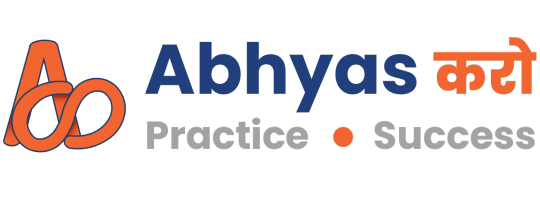
Final Thoughts:
The successful transition from UPSC prelims to mains preparation requires a thorough comprehension of the dynamic patterns and anticipated requirements of the examination. Practising with UPSC previous year question paper, UPSC mains question paper, UPSC question paper 2019, UPSC 2022 prelims question paper, UPSC question paper 2022, etc. offered by Abhyas Karo, is an essential approach to successfully address this disparity. By employing the skill of pattern recognition, identifying key focal points, and strategically aligning their preparation methods, individuals aspiring to succeed in the UPSC mains test can greatly increase their likelihood of achieving favourable outcomes. To excel in the UPSC mains and pursue a career in civil services, it is crucial to adopt a comprehensive strategy, incorporate diverse knowledge, and develop proficiency in the skill of constructing well-crafted answers.
#UPSC previous year question paper#UPSC question paper 2019#UPSC question paper 2022#UPSC 2022 prelims question paper#UPSC mains question paper#Online study material#career#JEE#NEET#GRE#study#paper practice#prelims#GSEB board
5 notes
·
View notes
Text
youtube
#Lawxpertsmv India#2022 UPSC Law Optional Mains Question Paper Solved#Solved UPSC Law Optional Mains Question Paper#Youtube
2 notes
·
View notes
Text
UPSC Previous Year Question Paper
Solving UPSC's previous years question papers gives you the idea of your level of preparation. Self-assessment is a major part of UPSC exam preparation. So, here DRISHTI IAS brings to you last several years of UPSC mains question papers with answer pdf.

#upscpreviousyearquestionpaper#upsc previous year question paper prelims#last 10 years upsc mains question papers pdf#upsc previous year question paper pdf#upsc previous year paper#upsc previous year question#upsc previous question papers#last 10 years upsc question papers with answers pdf#last 25 years upsc mains question papers with answers pdf#upsc previous paper#upsc prelims previous year question papers#upsc previous year paper in hindi#question paper of upsc
0 notes
Text
CSAT Course For UPSC (Ungist)
Introduction
In the realm of civil services examinations in India, the Union Public Service Commission (UPSC) stands as the most prestigious and challenging examination body. Aspirants dedicate years to preparing for these exams, and at the heart of their journey lies the CSAT, or the Civil Services Aptitude Test. In this comprehensive guide, we will delve into what the CSAT entails and how a dedicated CSAT course for UPSC can be a game-changer for UPSC aspirants.
What is CSAT?
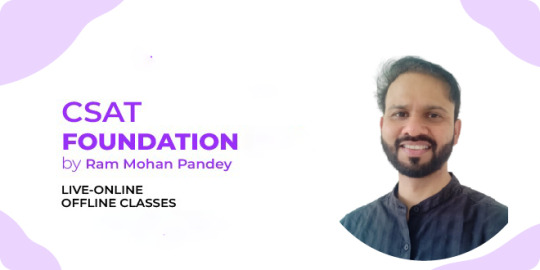
Understanding the Basics
The Civil Services Aptitude Test (CSAT) is a paper conducted by UPSC as part of the Civil Services Examination (CSE). It is the second of the two papers in the preliminary stage, with the first paper being the General Studies (GS) paper. CSAT was introduced in 2011, replacing the old Preliminary Examination pattern.
Format of CSAT
CSAT comprises two papers: Paper-I and Paper-II. While Paper-I is primarily aimed at testing a candidate's knowledge in areas such as history, geography, and economics, Paper-II focuses on aptitude and decision-making skills.
Scoring System
Each paper is of 200 marks, making a total of 400 marks for CSAT. To qualify for the Mains examination, candidates need to score a minimum cut-off in CSAT, as determined by UPSC.
Why is CSAT Important?
Filtering Candidates
The CSAT acts as a filtering mechanism, ensuring that only those with a certain level of analytical and reasoning abilities make it to the Mains. It helps UPSC identify candidates with the potential to excel in the rigorous civil services training.
Aptitude Test
CSAT assesses a candidate's aptitude for various administrative tasks, essential for the role of a civil servant. This includes decision-making, problem-solving, and communication skills.
The Need for a Dedicated CSAT Course
Specialized Training
Mastering CSAT requires a specialized approach. A dedicated CSAT course provides aspirants with expert guidance, study materials, and practice tests tailored to the CSAT syllabus.
Time Management
Time is of the essence in the UPSC exams. A CSAT course teaches candidates efficient time management skills, helping them tackle the paper's numerous questions within the stipulated time.
Mock Tests
CSAT courses often include mock tests that simulate the exam environment. These tests enable candidates to gauge their progress and identify areas that need improvement.
How to Choose the Right CSAT Course
Research
Before enrolling in a CSAT course, aspirants should thoroughly research various options. Look for courses with a proven track record of success and positive reviews from past students.
Experienced Instructors
The quality of instructors is paramount. Ensure that the course is led by experienced faculty with a deep understanding of the CSAT syllabus.
Customized Curriculum
Choose a CSAT course that offers a curriculum tailored to your needs. A one-size-fits-all approach may not be suitable for every aspirant.
Affordable Pricing
Consider your budget while selecting a course. Many CSAT courses offer flexible payment options to accommodate different financial situations.
Conclusion
Mastering the CSAT is a crucial step on the path to becoming a civil servant through UPSC. A dedicated CSAT course can make a significant difference in your preparation, providing you with the skills and knowledge needed to excel in this challenging paper.
FAQs
What is the CSAT exam?
The CSAT, or Civil Services Aptitude Test, is a paper conducted by UPSC as part of the Civil Services Examination to assess candidates' aptitude and decision-making skills.
Why is CSAT important for UPSC aspirants?
CSAT acts as a filtering mechanism and assesses aptitude, ensuring that candidates have the required skills for civil services roles.
What does a CSAT course offer?
A CSAT course provides specialized training, time management skills, and mock tests to help aspirants excel in the CSAT paper.
How can I choose the right CSAT course?
Research, consider experienced instructors, look for customized curriculums, and factor in affordability when selecting a CSAT course.
2 notes
·
View notes
Text
Crack NATO UPSC: Essential Guide & Strategy for Success
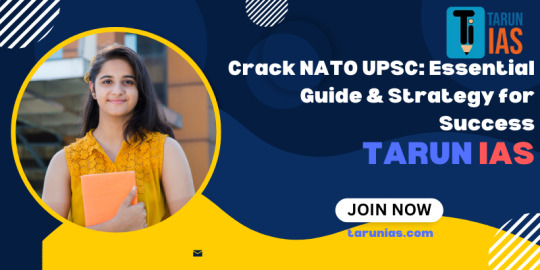
The North Atlantic Treaty Organization (NATO) UPSC exam is a highly sought-after gateway to a prestigious career in international relations and national security. Cracking NATO UPSC requires meticulous planning, strategic preparation, and unwavering dedication. This comprehensive guide equips aspiring candidates with the essential knowledge and strategies of NATO to conquer UPSC.
Understanding NATO for UPSC
NATO, also known as the North Atlantic Treaty Organization Union Public Service Commission Exam, is a national-level recruitment exam conducted by the UPSC (Union Public Service Commission) to select officers for various positions within the Indian Ministry of External Affairs dealing with NATO affairs. Success in NATO guarantees a dynamic and fulfilling career shaping India's strategic partnerships and engagement with NATO.
Eligibility Criteria for NATO
Before embarking on your preparation journey, ensure you meet the eligibility criteria for NATO:
Citizenship: You must be a citizen of India.
Age Limit: The minimum and maximum age limits are subject to change, so refer to the latest UPSC notification for the current year.
Educational Qualification: A bachelor's degree from a recognized university is mandatory.
Exam Pattern and Syllabus
The NATO UPSC exam follows a two-stage selection process:
Preliminary Examination: This objective-type exam comprises two papers – General Studies Paper I and General Studies Paper II (CSAT). Both papers are qualifying in nature, and marks obtained are not considered for the final merit list.
Main Examination: This stage consists of a written examination and an interview. The written exam includes seven papers, specifically designed to assess a candidate's knowledge, analytical skills, and suitability for the role.
For a detailed understanding of the syllabus and topics covered in each paper, refer to the official UPSC notification for NATO.
Recommended Resources for NATO UPSC Preparation
UPSC Syllabus and Previous Years' Question Papers: Refer to the official UPSC website for the latest syllabus and previous years' question papers to gain insights into the exam format and question trends.
NCERT Textbooks: NCERT textbooks for various subjects provide a strong foundation for General Studies preparation.
Standard Reference Books: Supplement your preparation with standard reference books recommended for the UPSC Civil Services Examination (CSE) and international relations.
Current Affairs Magazines and Periodicals: Subscribe to credible current affairs magazines and periodicals to stay updated on national and international developments.
Online Resources and Coaching Classes: Explore online resources and coaching classes specifically designed for NATO preparation for UPSC. These can offer valuable guidance, study materials, and mentorship.
Beyond Textbooks: Essential NATO Skills for UPSC
While a strong knowledge base is crucial, success in NATO for UPSC hinges on developing essential skills:
Critical Thinking and Analysis: The ability to analyze complex information, identify key issues, and form well-reasoned arguments is paramount.
Problem-Solving Skills: Develop effective problem-solving skills to address challenges related to international security and diplomacy.
Communication Skills: Hone your written and verbal communication skills to articulate your thoughts clearly and persuasively.
Leadership and Decision-Making: Develop strong leadership qualities and the ability to make sound decisions under pressure.
Time Management: Effective time management is essential for covering the vast syllabus, practicing answer writing, and revising effectively.
Remember: Patience, perseverance, and a focused approach are key to cracking NATO UPSC. With dedication, a strategic plan, and the right resources, you can turn your dream of a career with NATO into a reality.
Ready to embark on your UPSC journey? Contact Tarun IAS today and take the first step towards achieving your civil service aspirations!
0 notes
Text
Current Affairs for UPSC: Staying Updated with Khan Global Studies
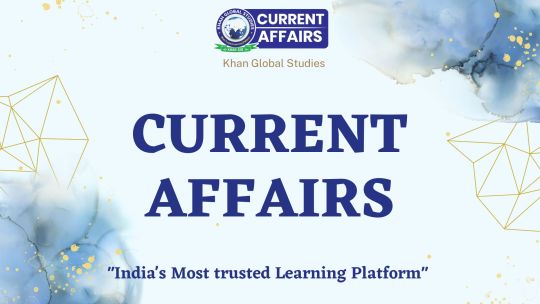
Cracking the UPSC exam is no easy feat, and one of the critical components of this preparation is staying updated with current affairs for UPSC. Understanding the significance of current events not only helps in the Prelims but also enriches answers in the Mains. This is where Khan Global Studies comes into play, offering comprehensive resources to keep you informed and ready.
Why Current Affairs Matter in UPSC
Current affairs are the backbone of the UPSC syllabus. They hold considerable weight in both the Prelims and Mains, particularly in General Studies Papers. By keeping up with the latest developments, you enhance your analytical skills, making your answers more nuanced and informed.
Sources of Current Affairs
The journey to mastering current affairs begins with identifying the right sources. Newspapers like The Hindu and Indian Express, along with magazines such as Yojana and Kurukshetra, are invaluable. Online platforms and apps offer daily updates, while government publications and reports provide authoritative insights.
Using Khan Global Studies for Current Affairs
Khan Global Studies is a game-changer for UPSC aspirants. This platform offers curated content, ensuring you don't miss out on crucial events. With features like daily summaries, in-depth analyses, and monthly compilations, it simplifies the vast syllabus, making it more manageable and easier to understand.
Effective Strategies for Current Affairs Preparation
Staying updated is a daily commitment. Make it a habit to read for at least an hour each day. Note-taking is crucial—summarize key points, jot down dates, and create mind maps. Monthly compilations are excellent for revision, ensuring you retain the information you’ve gathered over time.
Integrating Current Affairs with Static Syllabus
The real challenge lies in linking current events to the static syllabus. For instance, a new government policy should be understood in historical and economic contexts. Case studies and examples can enrich your answers, making them stand out. Regular practice through questions and mock tests is essential to gauge your understanding and preparation.
Conclusion
In conclusion, current affairs are indispensable in the UPSC preparation journey. They bridge the gap between theoretical knowledge and practical understanding. Utilizing resources like Khan Global Studies can streamline your preparation, providing structured and reliable content. Stay consistent, keep revising, and connect current events with your static syllabus to excel in the UPSC exam.
0 notes
Text
Expert Tips for UPSC Aspirants: Insights from Believers IAS Academy
Preparing for the UPSC (Union Public Service Commission) exams is a journey that demands dedication, strategy, and expert guidance. Aspirants often seek insights and tips from seasoned mentors who have navigated the challenges of this rigorous examination. In the pursuit of excellence, many turn to reputed academies like Believers IAS Academy, known for their exceptional track record and expert faculty.
Here, we delve into the top tips for UPSC aspirants, as shared by the experts at Believers IAS Academy:
Understanding the Syllabus: The UPSC syllabus is extensive, covering a wide range of subjects from history and geography to polity and economics. Experts emphasize the importance of thoroughly understanding the syllabus, its nuances, and the weightage given to each topic. This forms the foundation of a structured study plan.
Strategic Planning: Success in UPSC exams requires a well-thought-out strategy. Believers IAS Academy experts stress the need for a strategic approach that includes setting achievable goals, managing time effectively, and prioritizing topics based on their importance and one's proficiency.
Consistent Revision: Revision is key to retention and reinforcement of concepts. The faculty at Believers IAS Academy advises aspirants to allocate regular time for revision, ensuring that they stay updated with the latest developments and retain information effectively.
Current Affairs Mastery: Current affairs play a significant role in the UPSC exams, especially in the prelims and mains papers. Experts recommend staying updated with national and international news through newspapers, magazines, and reliable online sources. Integrating current affairs into daily study routines is crucial for success.
Mock Tests and Practice Papers: Practicing previous years' question papers and taking mock tests are indispensable aspects of UPSC preparation. Believers IAS Academy experts advocate for regular practice sessions to assess one's progress, identify strengths and weaknesses, and simulate exam-like conditions for better preparedness.
Effective Time Management: Time management is a skill that can make or break an aspirant's UPSC journey. Balancing multiple subjects, revision, and practice sessions requires efficient time allocation. The experts emphasize the importance of creating a realistic timetable and adhering to it diligently.
Seeking Guidance and Mentorship: Guidance from experienced mentors can provide valuable insights and clarity on complex topics. Believers IAS Academy experts encourage aspirants to seek guidance from faculty members, alumni, and peers, fostering a supportive learning environment conducive to success.
Maintaining a Positive Mindset: The UPSC journey can be arduous, with its share of challenges and setbacks. Maintaining a positive mindset, resilience, and perseverance are crucial attributes emphasized by the experts at Believers IAS Academy. Believing in oneself and staying motivated through the ups and downs is essential for achieving success.
Balanced Preparation: While focusing on core subjects is essential, experts advise aspirants not to neglect other areas of the UPSC syllabus. A well-rounded preparation that includes optional subjects, essay writing, and personality development is vital for comprehensive performance in the exams.
Stay Healthy and Balanced: Last but not least, maintaining physical and mental well-being is paramount during the UPSC preparation phase. Adequate sleep, regular exercise, and stress management techniques contribute to overall productivity and performance.
In conclusion, the journey of UPSC preparation is a challenging yet rewarding experience that requires dedication, perseverance, and expert guidance. Believers IAS Academy stands as a beacon of support and knowledge for aspirants, offering invaluable insights and tips to navigate the complexities of the examination. By incorporating these expert tips into their preparation strategy, UPSC aspirants can enhance their chances of success and realize their dreams of serving the nation.
0 notes
Text
Your Ultimate Guide to Cracking the Civil Services Exam
Blog- 1 AG IAS
Top 6 Steps to Becoming an IAS Officer:
Your Ultimate Guide to Cracking the Civil Services Exam
Becoming an Indian Administrative Service (IAS) officer is a dream for many in India. As one of the most prestigious and challenging roles in the country, the journey to becoming an IAS officer involves dedication, strategic planning, and hard work. Here's a step-by-step guide How to become IAS officer.
Step 1: Understand the Role and Requirements
What is an IAS Officer?
An IAS officer plays a crucial role in the administration of both the central and state governments, implementing policies and managing various governmental functions. The responsibilities range from handling administrative duties, law and order, developmental work, and more.
Eligibility Criteria
Before you start your preparation, ensure you meet the basic eligibility criteria:
Nationality: Indian citizen.
Age Limit: 21 to 32 years (general category) with age relaxations for other categories.
Educational Qualification: A bachelor’s degree from a recognized university.
Step 2: Learn About the UPSC Civil Services Examination
The Union Public Service Commission (UPSC) Civil Services Examination (CSE) is the gateway to becoming an IAS officer. The exam is conducted in three stages:
Preliminary Examination (Prelims): Objective-type questions to screen candidates for the Main Examination.
Main Examination (Mains): Descriptive-type questions to test candidates' academic and intellectual capabilities.
Personality Test (Interview): Assessing the candidate's personality, suitability, and decision-making abilities.
Step 3: Develop a Comprehensive Study Plan
Understand the Syllabus and Exam Pattern
Thoroughly review the syllabus and exam pattern for both the Prelims and Mains. Familiarize yourself with the subjects, topics, and weightage of each section. Key areas include:
General Studies
Optional Subject (chosen by the candidate)
Essay Writing
Ethics, Integrity, and Aptitude
Create a Timetable
Design a realistic and balanced timetable that covers all subjects and allows for regular revisions. Allocate time for:
Daily reading of newspapers and current affairs
In-depth study of subjects
Answer writing practice
Regular self-assessment through mock tests
Step 4: Gather the Right Study Materials
Standard Books and Resources
Select the best books and resources for your preparation. Some recommended books include:
NCERT Books: For basic concepts.
Indian Polity by Laxmikanth: For polity and governance.
Indian Economy by Ramesh Singh: For economics.
India's Struggle for Independence by Bipan Chandra: For modern history.
Online Resources
Utilize online platforms, apps, and YouTube channels that offer lectures, notes, and mock tests. Websites like ClearIAS, Mrunal, and Unacademy can be particularly helpful.
Step 5: Practice Regularly and Take Mock Tests
Answer Writing Practice
Effective answer writing is crucial for the Mains examination. Practice writing concise, coherent, and well-structured answers regularly. Join test series and participate in answer writing practice groups.
Mock Tests and Previous Year Papers
Regularly attempt mock tests to gauge your preparation level, identify weaknesses, and improve time management. Analyzing previous year question papers will give you insights into the exam pattern and frequently asked questions.
Step 6: Stay Consistent and Motivated
Stay Focused
Last by not the least step in How to become IAS officer Consistency is key to cracking the UPSC exam. Stick to your study plan, and avoid procrastination. Maintain a balance between study and relaxation to prevent burnout.
Stay Updated and Adaptive
Stay updated with current affairs, government policies, and global events by reading newspapers like The Hindu, Indian Express, and magazines like Yojana and Kurukshetra. Adapt your study plan based on feedback from mock tests and changing patterns in the exam.
Join a Support Group
Joining a study group or online forum can provide you with support, motivation, and valuable insights. Engaging with peers preparing for the same goal can help in maintaining a competitive spirit.
Conclusion
Becoming an IAS officer is a rigorous journey that requires strategic planning, perseverance, and dedication. By following these six steps—on How to become IAS officer understanding the role and requirements, learning about the UPSC exam, developing a study plan, gathering the right materials, practicing regularly, and staying consistent—you can enhance your chances of success. Remember, the path may be challenging, but with determination and hard work, your dream of becoming an IAS officer can become a reality. Good luck!
0 notes
Text
10 Things To Know About UPSC Civil Services

The UPSC Civil Services Exam (CSE) is an esteemed and tough test in India. Here are ten essential things to know about it:
What is the UPSC CSE?
The Civil Service Examination in India, including the Indian Administrative Service (IAS), Indian Police Service (IPS), and Indian Foreign Service (IFS), is held by the Union Public Service Commission (UPSC) in order to select employees into different kinds of civil services offered by the government of India.
Eligibility Criteria
To appear for the UPSC CSE examination, you must have completed a degree program from an recognized institution with no restrictions on the course pursued. The minimum age is 21 years, and the maximum age limit varies by category (32 years for General, 35 for OBC, 37 for SC/ST).
Exam Stages The UPSC CSE has three rounds:
Preliminary Exam: The Preliminary Exam is a screening test that has two objective-type papers (General Studies and CSAT).
Mains Exam: In a written exam, there are write-ups in nine descriptive papers, with an article, four General Studies papers, two optional subject papers, and two language papers.
Interview: Also known as the Personality Test, it assesses the candidate's suitability for a career in civil services.
Syllabus
To cover subjects from Indian history, geography, polity, economy, environment, science and technology, present happening, ethics and optional subjects, it is advised to have a UPSC CSE syllabus that is wide. We ought to have a solid study plan.
Optional Subjects
In the Mains Exam, candidates choose one optional subject from a list provided by UPSC. This helps them improve their scores through using their educational background or personal interests.
Preparation Time
Preparing for the UPSC CSE typically requires dedicated study over 1-2 years.Staying consistent, disciplined and motivated is crucial throughout this period of preparation.
Importance of Current Affairs
If you follow the newspapers and watch the news regularly, you will not get caught unawares in either the Preliminary or Mains examination. Also, make a point of using current affairs magazines.
Mock Tests and Practice
Mock tests should always be taken and the previous years’ question papers should always be revised. This is because it helps one practice interesting exams and realize which sections require more work on time management and how the questions are framed for what types of answers.
Interview Preparation
The Personality Test evaluates the kind of person you are, how good (or poor) are you in talking and how fit are you to be employed in civil services. The only way to succeed in this test is by believing in yourself, saying the truth, and be aware of what happens around you locally or nationally.
Success Rate
The UPSC CSE is quite competitive with success rate up to a percentage lower than 1%. Around 10 to 12 lakhs candidates are applying every year but only few hundreds get selected for final list. Persistence, hard work, and a strategic approach are key to succeeding.
Conclusion
The journey to becoming a civil servant through the UPSC CSE is challenging but immensely rewarding. It requires thorough preparation, dedication, and a positive mindset. Understanding these ten key aspects can help you navigate the preparation process effectively and increase your chances of success.
If you’re interested in UPSC Institute in Delhi then Visit Vedanta IAS Academy, it’s worth checking out their offerings and reviews to see if they align with your needs and preferences.
0 notes
Text
Going Through the IES Exam: A Journey for Civil Engineers
For those in India who want to become civil engineers, the Indian Engineering Services (IES) test is the final frontier. It's more than just a test; it's a means of gaining entry into esteemed roles in numerous government agencies and institutions. The Union Public Service Commission (UPSC) administers the IES exam, which requires commitment, planning, and thorough understanding of civil engineering fundamentals. Let's examine the significance of this exam and strategies for candidates to succeed on it.
First and foremost, it's important to comprehend the exam format. The preliminary exam, the mains exam, and the personality test are the three phases of the IES exam. An objective test covering general education and engineering ability makes up the preliminary exam. Majors go further into particular engineering specialties, such as civil engineering. Finally, the personality test evaluates a candidate's fit for an administrative position.
While a thorough understanding of related disciplines like mathematics, physics, and general studies is equally important, candidates for civil engineering should concentrate on key areas like structural analysis, geotechnical engineering, engineering for transportation, and environmental engineering.
IES exam preparation calls for a multifaceted strategy. In addition to being proficient in technical disciplines, candidates must to keep up with current events, governmental directives, and developments in the field of civil engineering. It is essential to regularly practice using past years' question papers and mock exams in order to assess one's readiness and pinpoint areas that require work.
Effective time management is essential during the exam. There is a lot of material to cover, so it's critical to manage your time well and give each subject enough time to be thoroughly reviewed before the test. Creating and following a study program will help you stay disciplined and consistent during the preparation stage.
Additionally, obtaining mentorship from seasoned individuals or enrolling in respectable coaching programs can yield priceless learning resources and perspectives. Studying in groups with classmates can improve learning and problem-solving abilities by creating a supportive yet competitive atmosphere.
Maintaining one's physical and mental health is another factor that is frequently disregarded. Burnout and mental exhaustion might result from the demanding preparation process. To keep refreshed and focused, it's critical to find a balance between studying and leisure, engaging in hobbies, exercising, and getting enough sleep.
It is important to face the exam on D-day with a composed and quiet attitude. Effective time management, attentive reading of instructions, and methodical question-answering can all have a big impact on performance.
In summary, the IES exam for civil engineering is a journey that requires tenacity, diligence, and strategic preparation in addition to being a test of knowledge. Aspirants can confidently embark on this road and succeed by taking a holistic approach to preparation, keeping up with current trends, and maintaining a healthy work-life balance.
Start Your Preparation With: https://gameacademy.in/ / https://clppenny.page.link/cTBm
0 notes
Text
4 Essential Strategies for MPPSC Preparation: A Comprehensive Guide

MPPSC (Madhya Pradesh Public Service Commission) is one of the most prestigious exams in India. Every year, thousands of aspirants appear for this exam in hopes of securing a government job in the state of Madhya Pradesh. However, cracking this exam is not an easy feat. It requires months of dedicated preparation and a strategic approach. In this blog post, we will discuss five essential strategies for MPPSC preparation that will help you ace this exam.
Also Read: Gaurav Marwaha
1) Understand the Exam Pattern and Syllabus:
The first and foremost step towards MPPSC preparation is to understand the exam pattern and syllabus. The exam is conducted in three stages - Prelims, Mains, and Interview. It is crucial to have a clear understanding of the syllabus for each stage and the weightage of each subject. This will help you plan your preparation accordingly and focus on the most important topics.
Also Read: UPSC Coaching Institute in Bhopal
2) Create a Study Plan:
Once you have a clear understanding of the exam pattern and syllabus, the next step is to create a study plan. This plan should include daily, weekly, and monthly targets, keeping in mind the time left for the exam. It is essential to allocate enough time for each subject and revise regularly. Make sure to include breaks in your study plan to avoid burnout.
3) Read Newspapers and Stay Updated:
Current affairs play a crucial role in the MPPSC exam. It is essential to stay updated with the latest happenings in the state, country, and the world. Make it a habit to read newspapers daily and make notes of important events and issues. You can also refer to monthly magazines for a quick revision of current affairs.
Also Read: MPPSC Coaching in Bhopal
4) Practice Previous Year Papers:
Practicing previous year papers is an essential strategy for any competitive exam, and MPPSC is no exception. It will help you understand the exam pattern, the type of questions asked, and the difficulty level. It will also improve your time management skills and boost your confidence. Make it a habit to solve at least one paper every day.
5) Join a Reputed Coaching Institute:
Joining a reputed coaching institute can make a significant difference in your MPPSC preparation. They have experienced faculty who can guide you and provide you with the right study material. Coaching institutes also conduct mock tests, which will help you assess your preparation and identify your weak areas. However, it is essential to choose the right coaching institute that suits your needs and budget.
0 notes
Text
UPSC Previous Year Question Papers: 2019 & 2022 Prelims and Mains
Access UPSC question papers from 2019 and 2022, including both prelims and mains. Prepare for the UPSC exams effectively with Abhyaskaro's comprehensive collection of UPSC previous year question papers for thorough practice and exam readiness.

#UPSC previous year question paper#UPSC question paper 2019#UPSC question paper 2022#UPSC 2022 prelims question paper#UPSC mains question paper
5 notes
·
View notes
Text
Cooperative federalism and Competitive federalism are very important topics that are asked in the UPSC exam. Both are also important for the growth of the country. Get fully solved question papers from Lawxpertsmv India for cooperative and competitive federalism upsc topics.
https://www.lawxpertsmv.com/post/co-operative-vs-competitive-federalism-in-india-upsc-law-optional-mains-2018-question-solved
2 notes
·
View notes
Text
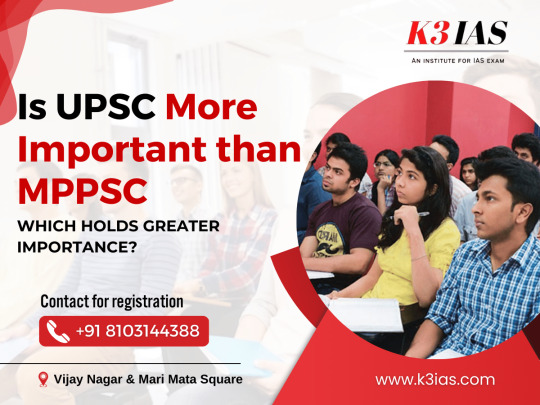
Is UPSC More Important than MPPSC, Which Holds Greater Importance?
In India, the acronyms UPSC and MPPSC often evoke a mix of excitement and anxiety among aspiring civil servants. These exams offer distinct paths to serving the public, with varying levels of impact and scope. This article aims to highlight the key differences between the Union Public Service Commission (UPSC) and the Madhya Pradesh Public Service Commission (MPPSC), helping you determine which exam aligns best with your career goals.
National Reach vs. State Focus
The most significant difference between UPSC and MPPSC lies in their geographical scope and impact. UPSC recruits officers for all-India services and central government positions, such as the Indian Administrative Service (IAS), Indian Police Service (IPS), and Indian Foreign Service (IFS). These roles enable you to influence policies and administration at a national level, affecting millions of lives across India.
In contrast, MPPSC focuses solely on the state of Madhya Pradesh. Success in this exam leads to Group A and B officer positions within the state bureaucracy. As an MPPSC officer, your work will directly impact the citizens of Madhya Pradesh, shaping local policies and development initiatives.
Exam Structure and Syllabus
Both UPSC and MPPSC follow a three-stage selection process: Preliminary, Main, and Interview. However, there are notable differences in the level of competition and the depth of the syllabus.
UPSC Exam Structure:
Preliminary Exam: Consists of two papers—General Studies and Civil Services Aptitude Test (CSAT).
Mains Exam: Includes nine papers covering a wide range of subjects such as Indian Polity, Economy, History, Geography, Science & Technology, and more. It requires a broad understanding of national and international issues.
Interview: Tests your personality and suitability for a career in civil services.
MPPSC Exam Structure:
Preliminary Exam: Similar to UPSC but includes more state-specific questions.
Mains Exam: Comprises six papers, with a significant focus on topics related to Madhya Pradesh, including its history, geography, economy, and administration.
Interview: Assesses your personality and suitability for state civil services.
The competition for UPSC is nationwide, making it more intense compared to MPPSC, which primarily attracts candidates from Madhya Pradesh.
UPSC Preparation: Expert IAS Mentors and Coaching Institutes
Given the vastness of the UPSC syllabus, preparing for this exam often requires guidance from expert IAS mentors. Enrolling in a top UPSC coaching institute can provide structured preparation and strategic insights. Many candidates also benefit from online coaching for IAS, which offers flexibility and access to a wide range of resources and expert guidance from the comfort of your home.
Career Aspirations: National Impact or State-Level Service?
Deciding between UPSC and MPPSC depends largely on your career aspirations and where you want to make an impact. Here’s a breakdown to help you decide:
UPSC:
If you aim to influence national policies and administration, UPSC is the way to go.
The prestige and power associated with IAS, IPS, and IFS positions are substantial.
These roles often involve a dynamic and challenging career with frequent transfers and diverse responsibilities across the country.
MPPSC:
If your passion lies in serving the people of Madhya Pradesh, MPPSC is a better fit.
You’ll have the opportunity to contribute directly to local development and understand state-specific issues deeply.
MPPSC roles typically offer a more stable work-life balance, allowing you to serve in your home state and build lasting community connections.
Work-Life Balance
The nature of work and lifestyle in UPSC and MPPSC roles also differ. UPSC officers, such as IAS officers, often face demanding schedules with frequent transfers across different states. This nomadic lifestyle can be challenging but also offers diverse experiences and opportunities to make a broad impact.
On the other hand, MPPSC officers generally enjoy a more stable work-life balance. They usually remain within Madhya Pradesh, which allows them to establish deeper roots in their communities and maintain personal stability.
Additional Considerations
Language:
Both exams offer Hindi as an option, but UPSC provides a wider choice of languages for the Preliminary exam. This can be an important factor if you are more comfortable in a regional language other than Hindi.
Preparation Time:
Preparing for UPSC courses generally requires more time due to its vast syllabus and the high level of competition. MPPSC, with its state-specific focus, might require slightly less preparation time, but it still demands dedicated effort.
UPSC Courses:
Many top UPSC coaching institutes offer specialized UPSC courses that cover the entire syllabus comprehensively. These courses often include mock tests, study materials, and interactive sessions with experienced mentors.
Conclusion:
Choosing between UPSC and MPPSC is not about determining which exam is more important but about aligning the exam with your vision for your future. Both paths offer prestigious careers dedicated to public service, but the right choice depends on your aspirations and where you want to make your impact.
Dreaming of wielding national influence and shaping India's future? UPSC is the path for you.
Passionate about serving your home state and making a local impact? MPPSC is the way to go.
Both UPSC and MPPSC offer immense opportunities to contribute to the betterment of society. Take your time to assess your goals, understand the demands of each exam, and choose the path that ignites your passion and fuels your determination to make a difference. Good luck on your journey to becoming a civil servant.
0 notes
Text
Importance of UPSC Current Affairs 2024:
Every year, the UPSC exam extensively covers current affairs from national and international domains. The questions in the prelims and mains papers often revolve around contemporary issues, government schemes, global events, scientific advancements, and socio-economic developments.
0 notes